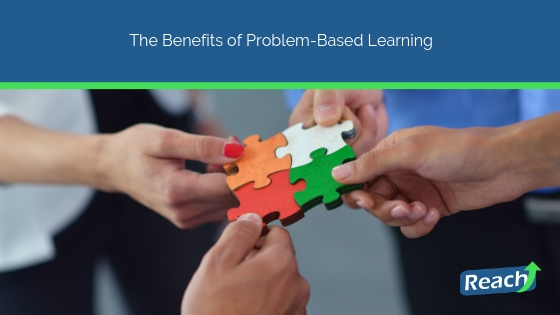The Benefits of Problem-Based Learning

Understanding how the human mind absorbs and stores information is critical when creating a mobile app to assist with training your employees. In order for your app to be as effective as you need it to be, you must incorporate educational strategies that have been proven to work.
One such strategy is the theory of problem-based learning (PBL).
What is this theory?
Essentially, it is an approach to learning that focuses on posing questions to students that are challenging, open-ended and that have no one “right” answer. The goal of the approach is to get learners accustomed to investigating and discovering meaningful solutions to any problems they face.
And the theory has been proven to work, with studies showing that students who are exposed to PBL demonstrate improved critical thinking skills and a stronger ability to resolve conflict.
But what are the benefits of problem-based learning that employers can expect to see if they invest in a mobile app for training?
In this article, we’ll be diving into how the Reach app incorporates problem-based learning and sharing a few of the key benefits our clients can expect to gain from implementing our app.
HERE ARE THE THREE KEY BENEFITS OF PROBLEM-BASED LEARNING:
- PBL PROMOTES SELF-RESPONSIBILITY IN LEARNING
Many employers are challenged with the task of motivating and engaging their team members when they decide to implement employee training. This can be particularly difficult, since employees are often so focused on their jobs that they see interruptions (even opportunities to enhance their skills) as an interruption to their day-to-day tasks.
Problem-based learning can help employees take responsibility for learning-related objectives, by setting clear expectations and educational goals.
Within the Reach app, each employee can view their personal learning path, and familiarize themselves with the learning milestones they are expected to meet.
Additionally, the Reach app uses gamification techniques to reward employees who achieve these milestones, providing them with instant reinforcement. This timely positive feedback keeps employees engaged in the training process, and makes them feel more inclined to participate.
As a result, employees become responsible for their own success, taking control of the pace at which they complete their training, and becoming self-motivated to reach new levels of achievement.
- PROBLEM-BASED LEARNING IMPROVES LONG-TERM RETENTION RATES
As an employer, you need to know that your employees will remember their training not just immediately after they complete it, but well into the future.
Conveniently enough, the improvement of long-term retention rates is one of the leading benefits of problem-based learning.
In fact, in a study where Dutch medical students were exposed to PBL while some of their peers weren’t, the students who participated in problem-based learning graduated at an 8 percent higher rate. The PBL students also graduated on average 5 months earlier than their colleagues who were still using the traditional curriculum.
Studies like this show that problem-based learning has a very real and tangible impact on long-term retention and educational outcomes.
For this reason, our Reach app incorporates the theory of problem-based learning, presenting problems to employees that don’t have one clear answer. These scenarios allow employees to articulate how they would respond, and our convenient mobile app provides employers with the chance to give immediate feedback, fostering a collaborative and responsive learning environment.
- PBL CREATES A COLLABORATIVE LEARNING ENVIRONMENT
This is one of the benefits of problem-based learning that is always worth elaborating on.
Team-based learning is one of the most effective educational approaches there is. In fact, students taught with interactive engagement methods exhibit learning gains that are almost two standard deviations higher than those observed in traditional courses.
This is because team exercises can help employees generate diverse ideas, views, opinions and feedback, while also helping them to constructively resolve conflict and find a solution that most beneficial for all involved.
Simulation learning is another common form of PBL that strengthens collaborative skills, and is a feature that is included within the Reach app.
When employees engage in simulations, they are forced to work in unison with other students who are participating in the exercise, and they must use their critical thinking skills to navigate a scenario that is based on situations they will encounter in their professional roles.
With the benefits of collaborative learning being so apparent, we knew that incorporating team-based learning opportunities into the Reach app would assist our clients in obtaining their employee training objectives.
In fact, in a study of two chemistry classes, 33 percent of the students in the lecture class dropped out of the course, compared to only 17 percent of those who participated in a team-based learning class.
Findings like these give our team confidence that these learning strategies are worth investing in, and that we are making the right choice by combining these strategies with the power of a convenient and easy-to-use app.
